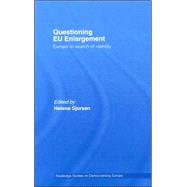- ISBN: 9780415376570 | 0415376572
- Cover: Hardcover
- Copyright: 8/2/2006
The European Union (EU) is a contested entity. What kind of polity is it? Its status is unclear and ambiguous and there are different interpretations of what constitutes its core characteristics, as well as of the future direction of integration. To some, the EU is mainly a market, securing the free movement of goods and capital, and providing opportunities for economies of scale for European firms. To others it builds on a common European identity and common European values. Others again see the EU as the first step towards a democratic, supranational polity. Can the enlargement process help us to achieve a better understanding of the nature of the EU? In this book we ask what kind of understanding of the EU the enlargement process speaks to. Does it mainly suggest that the EU is a free market, focusing on potential economic gains? Does it indicate that there is a sense of common European identity, which guides the selection of candidates? Or is the focus primarily on securing respect for democratic principles and human rights? Surprisingly, although enlargement has been a fundamental feature of the European Union (EU) since its early days, few systematic studies of its significance for European integration have been produced. Rather, enlargements have been seen as isolated episodes, which do not tell us much about the EU as such. It is quite clear, however, that the issue of membership and how it is dealt with is at the core of any political community- including the EU. In fact, one might argue that without looking at this issue, it would be difficult to get a clear picture of what kind of order is emerging in Europe. In order for an organization to find criteria forinclusion (as well as exclusion) of members one would expect it to have, or to be forced to form, an idea of what its fundamental purposes are. New applications for membership, the prospect of enlargement, inevitably raise questions such as who the Europeans are and what kind of values characterize Europe. Deciding where Europe stops, or should stop, is a particular challenge. What kinds of criteria are being used to determine such a question?






